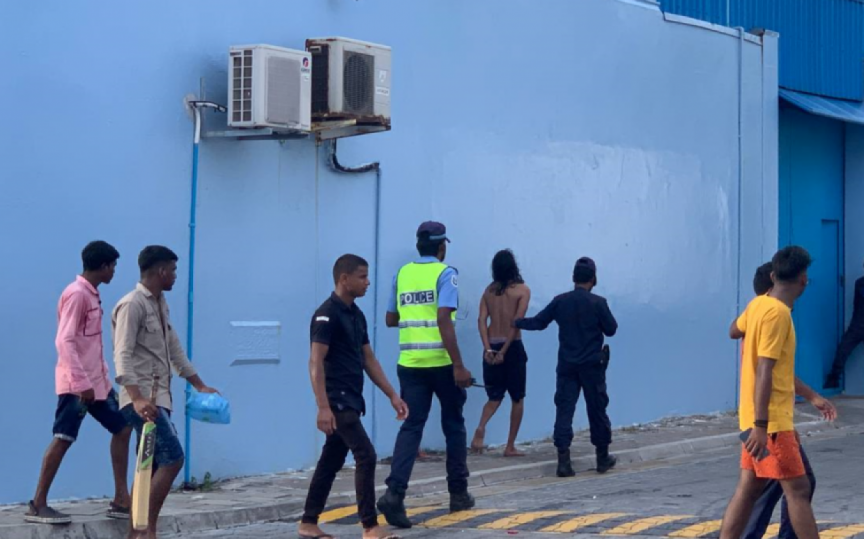
A suspect being taken into Atholhuvehi remand centre: Police to go ahead with the postmortem of Ahmed Afrah who died while in police custody despite the family’s protests.
Maldives Police Service, on Wednesday, said they will proceed with the postmortem of Ahmed Afrah—who died in police custody on Sunday, two days after being arrested on drug-related charges—despite opposition from his family. However, they have not yet confirmed when his body will be sent abroad for the procedure.
Ahmed Afrah, 48, was arrested on suspicion of drug abuse on Friday. He was discovered unresponsive in cell No. 7 of Atholhuvehi detention facility in Male' City, where he was being held, at approximately 05:50am on Sunday morning. He was subsequently taken to Indira Gandhi Memorial Hospital (IGMH), which confirmed he was already deceased at arrival.
Afrah’s family has alleged that he died after he was denied medical treatment by the Police. The family has also stated that they are against conducting a postmortem on his body.
Despite this, Police told Sun on Wednesday that they will proceed with the postmortem of Afrah to identify the cause of his death. A police spokesperson stated that efforts are ongoing to transport Ahmed Afrah’s body abroad, but noted that a specific date cannot be confirmed yet, as the necessary arrangements are still being finalized.
Family sources identified Ahmed Afrah as originally from Hithahfinivaage, A.Dh. Maamigili, though his official residence was registered at G. Zaamiya house in Malé. He worked as a Chief Engineer for the Villa company. Afrah, who had been married twice and had no children, primarily lived in Maamigili, visiting Malé roughly once a month to see his wife, who works in the capital.
According to Mohamed Ibrahim, Afrah’s younger brother, he had recently been staying in a rented room in Malé. Last Friday, Afrah reportedly met his wife and told her he was feeling severely unwell. "It's difficult for people when they stop using drugs. My brother said he had quit, and he was really struggling that day," Mohamed said. He added that while Afrah did have a history of drug use, his criminal record only included substance abuse—there were no theft or related charges often linked with addiction. Afrah had always worked steadily in the engineering sector.
Mohamed explained that Afrah had come to Malé to visit his wife, but when she was later unable to contact him, she reached out to the guesthouse where he was staying and learned of his arrest. She then reportedly contacted the police station to inform them about his health issues and the need for medical treatment.
"He asked for treatment, but nothing was done. He was kept in a group cell when he died," Mohamed said. "I was told that the police entered the cell at around 5:30am to place another person inside and that's when they found my brother dead. That’s what the officers at IGMH told me."
Mohamed also shared that the family—including Afrah’s elderly parents—strongly opposes a postmortem or autopsy, and wishes for his immediate burial. "This is for the police's own interests. We gain nothing from it," he said, suggesting the process may be influenced by authorities. "They can say whatever they want in the report. I told them to release the body—we’ll sign whatever document they want. They’re doing this to cover up police or government negligence."
During a visit to IGMH, where Afrah’s body is being kept, Mohamed said he questioned the Investigation Officer (IO) about why Afrah was denied treatment after asking for help. According to Mohamed, the IO simply smiled and said, "How would I know? People fake things all the time. Just because someone says they’re sick doesn’t mean we can believe them."
Notably, the court order on Afrah’s remand had acknowledged that he required medical attention.